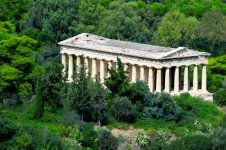It's an Olympics year so I decided to learn a little bit about it.
Specifically, I'm drawn to its roots in Greece, where it all began. The tales from Olympia, where athletes from city-states across Ancient Greece competed, not just for glory but for the favor of the gods, paint a vivid picture of society's value system and cultural priorities at the time.
Yet, despite the bits and pieces of information I've gathered, I realize there's so much more depth and nuance to understand about how these games influenced, and were influenced by, Greek society and beyond. From the types of events that were held, the athletes who competed, to the very ethos that powered these competitions - each element seems to carry its own story.

